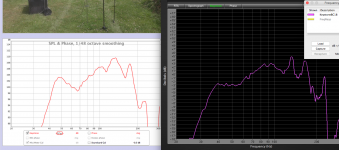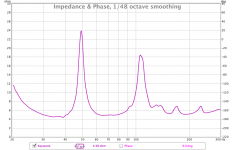Finally!! Yesterday I was able to measure my speakers outside in the open and I took the opportunity to measure as many as I could. Here's part 1: the subs.
I have 3 different subs:
1. Art Welter's Keystone, loaded with B&C 18TBX46-4, the predecessor of the 18TBX100 with largely the same T/S-parameters. This woofer came out of a HK Lucas set. It is a 4 Ohms version and it is rated 1000 W RMS, 2000 W program.
2. Bill Fitzmaurice's Titan 48, loaded with Eminence Kappalite 3015LF (old version), 8 Ohms, and is rated 450 W RMS, 900 W program. Mine are built 21" wide instead of the recommended 24".
3. My own design doing double duty as a drumriser, loaded with 18Sound 18NLW9600, 4 Ohms, rated 1800 W RMS, 3600 W program. Details here (though Photobucket has f*cked up readability): http://www.diyaudio.com/forums/subwoofers/224823-beyma-18p80nd-sub-horn-am-missing.html
All measurements were taken at groundplane at 10 meter with 8.94 V (= 10 W into 8 Ohms) going into the sub(s). This was done to prevent clipping the measurement mic (I started at 28.3 V (= 100 W into 8 Ohms) but soon noticed the clipping 🙁. Dropping power by a factor of 10 lowers SPL by 10 dB, so I figured this would result in the best measurements I could do, still having enough margin over background noise (+/-65 dB). All graphs are offset +10 dB to correct for this and should provide the 'standard' 2.83V/1m curves.
1. Keystone:
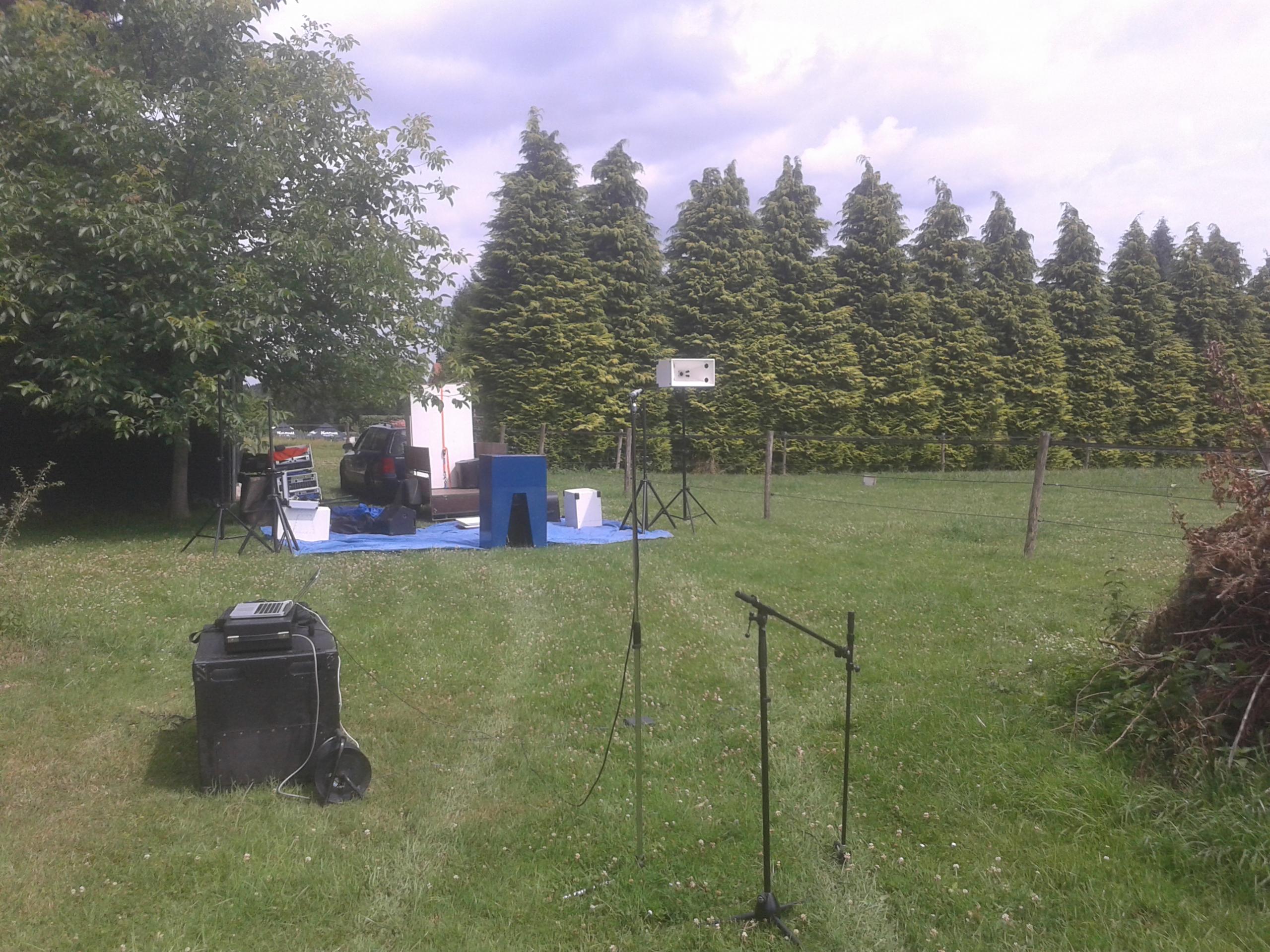
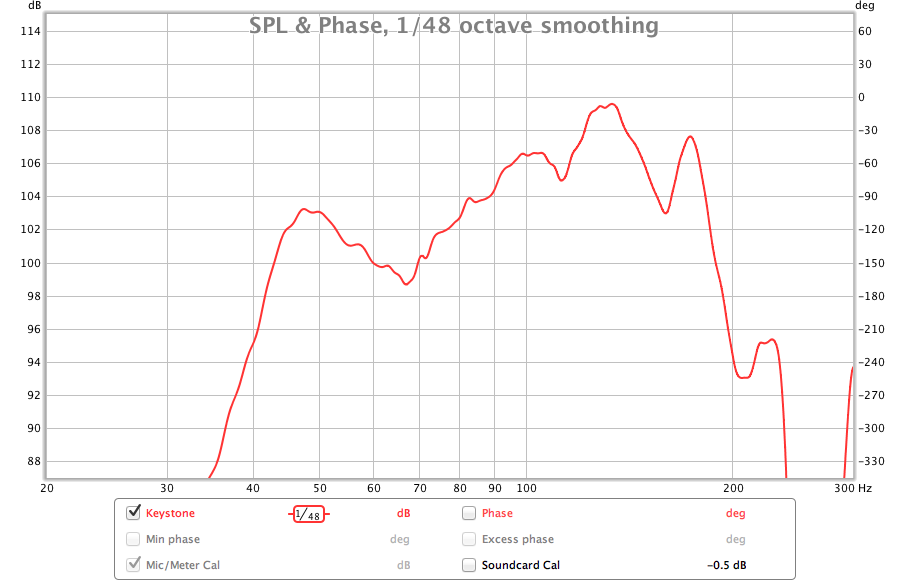
2. Titan 48:
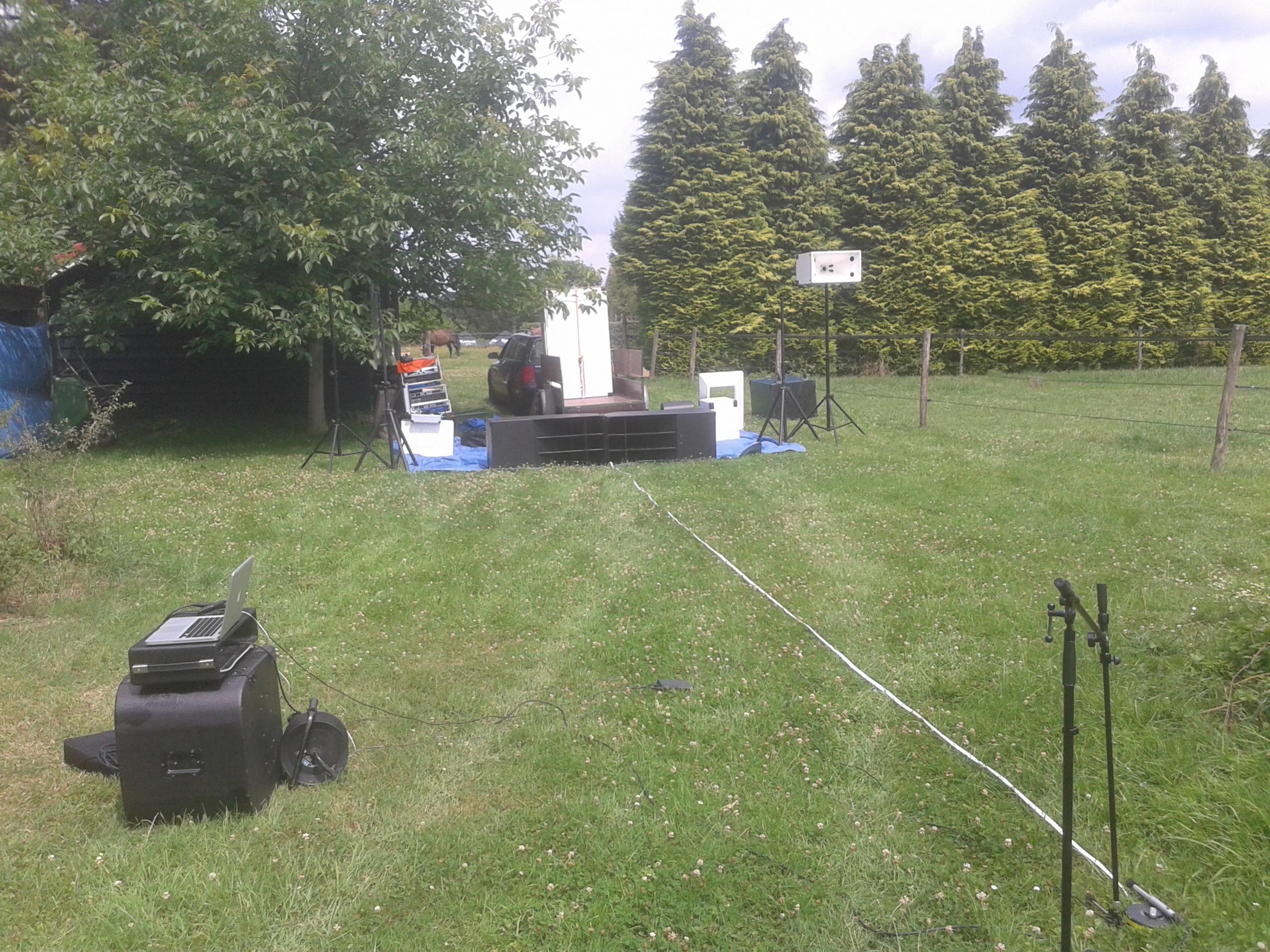
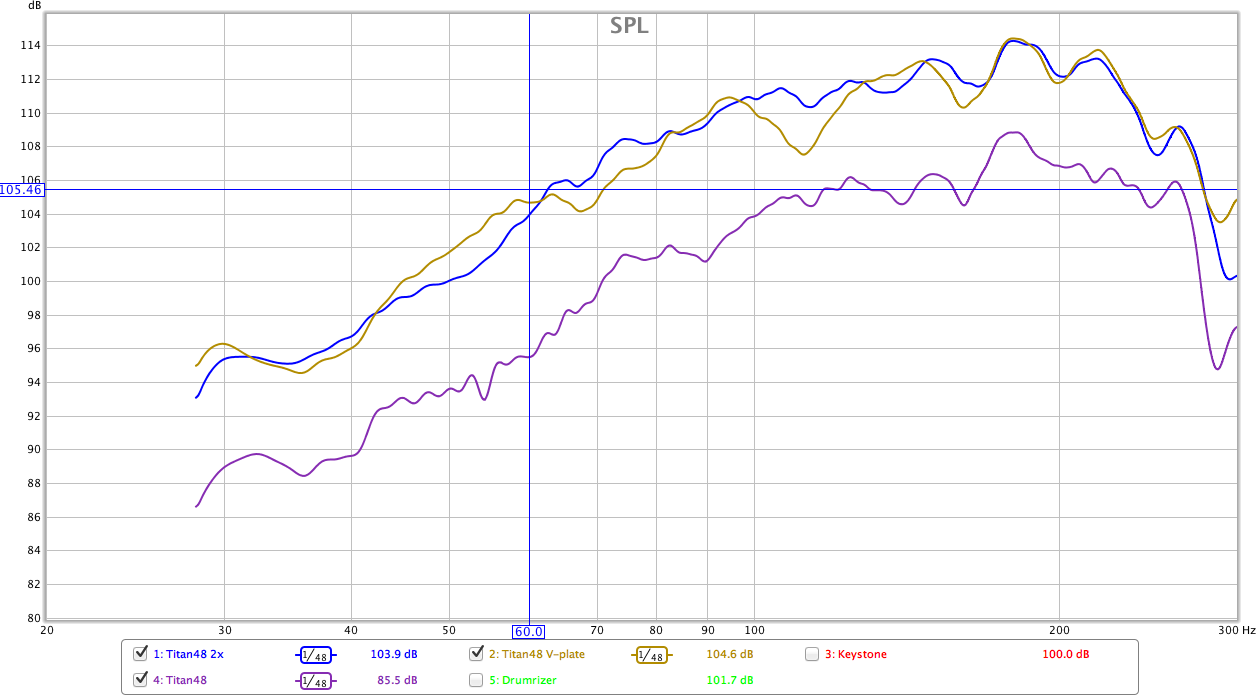
3. Drumriser:
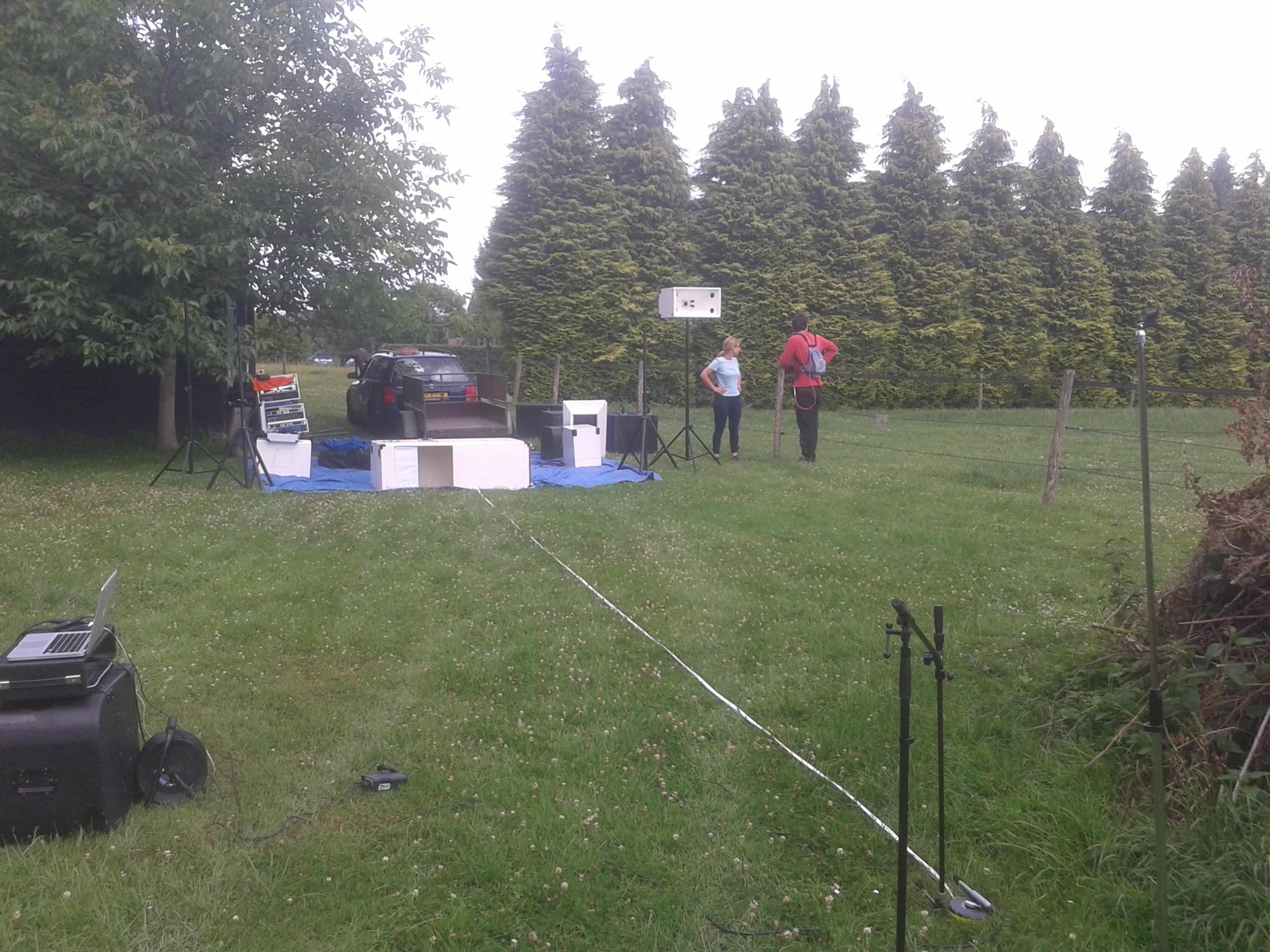
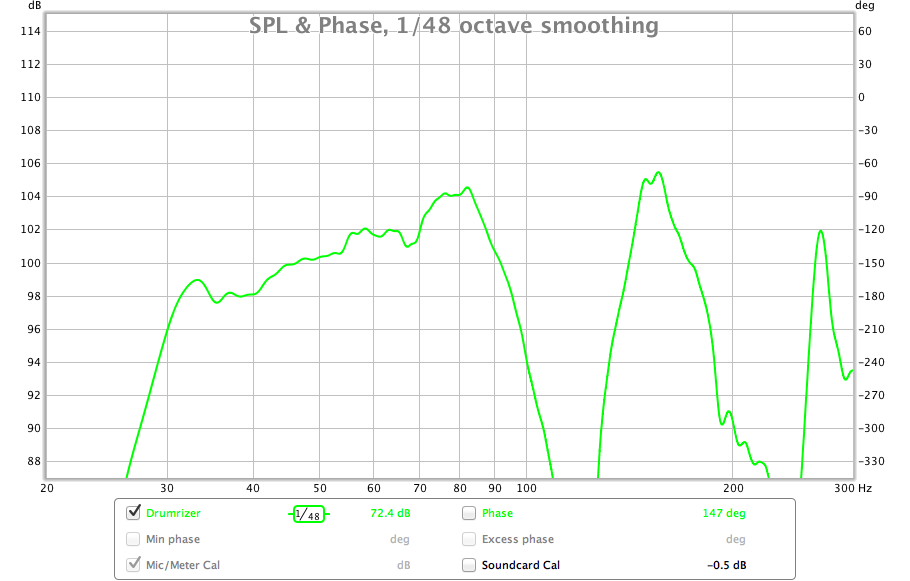
Comparison charts
Keystone vs single and dual V-plated Titan 48:
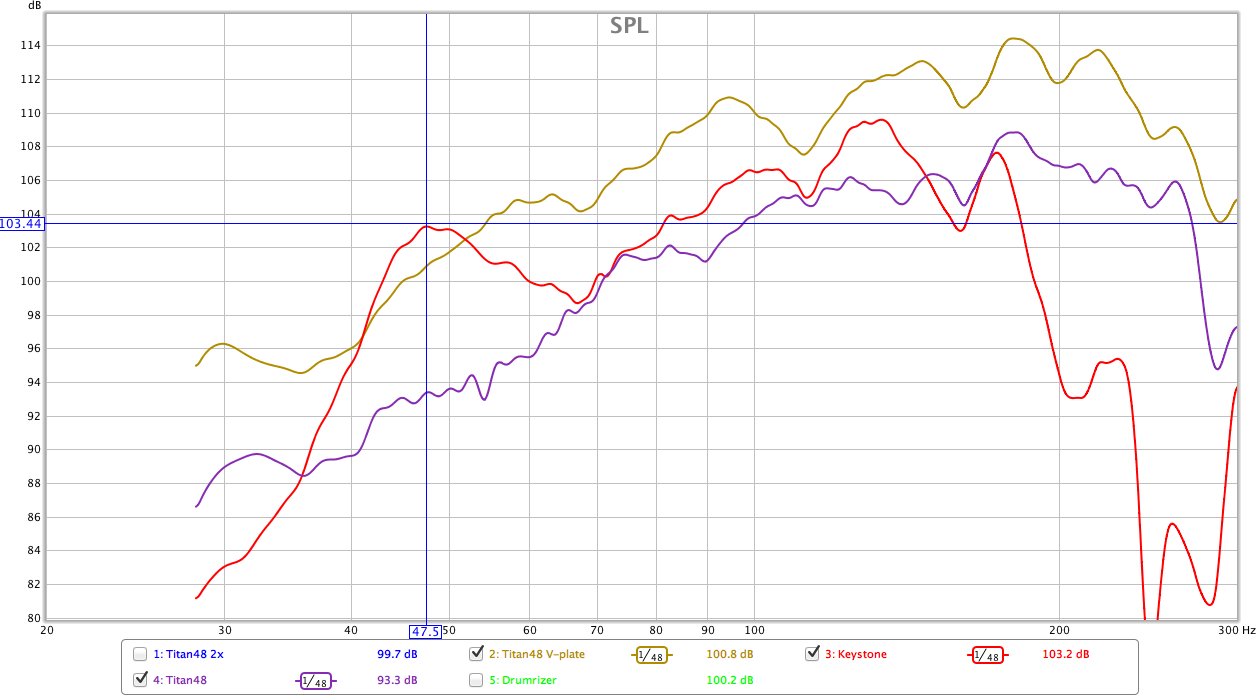
Keystone vs drumriser:
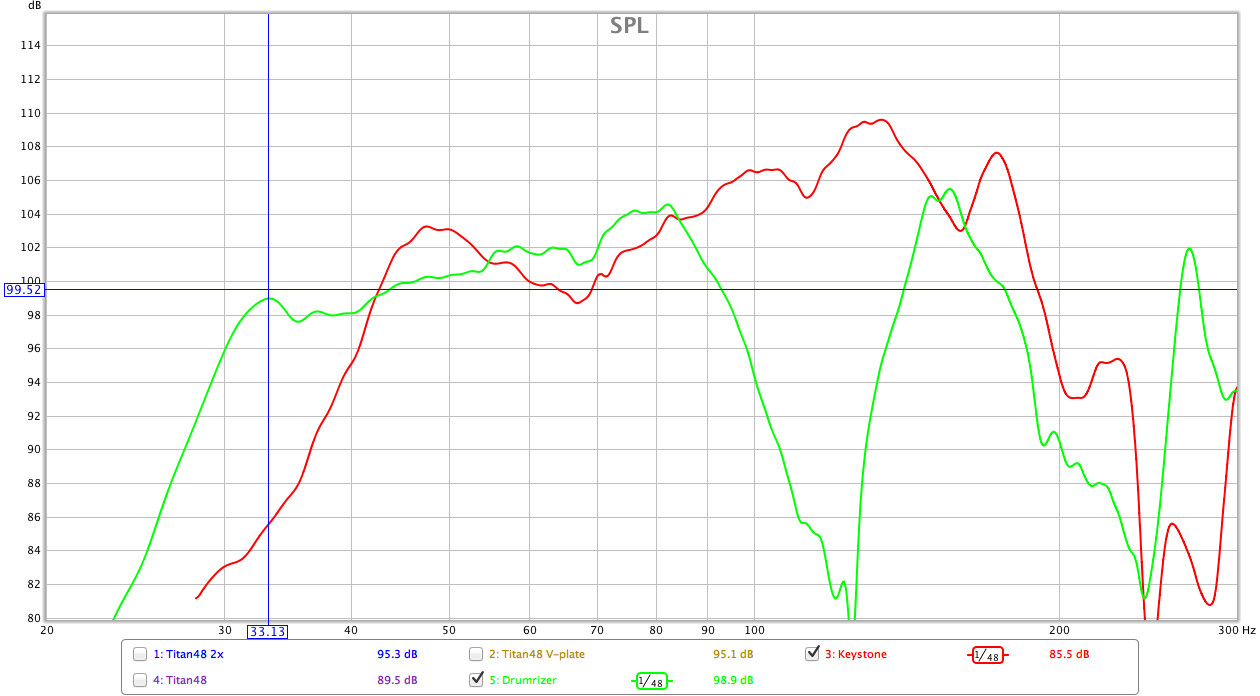
Single and dual V-plated Titan 48 vs Drumriser:
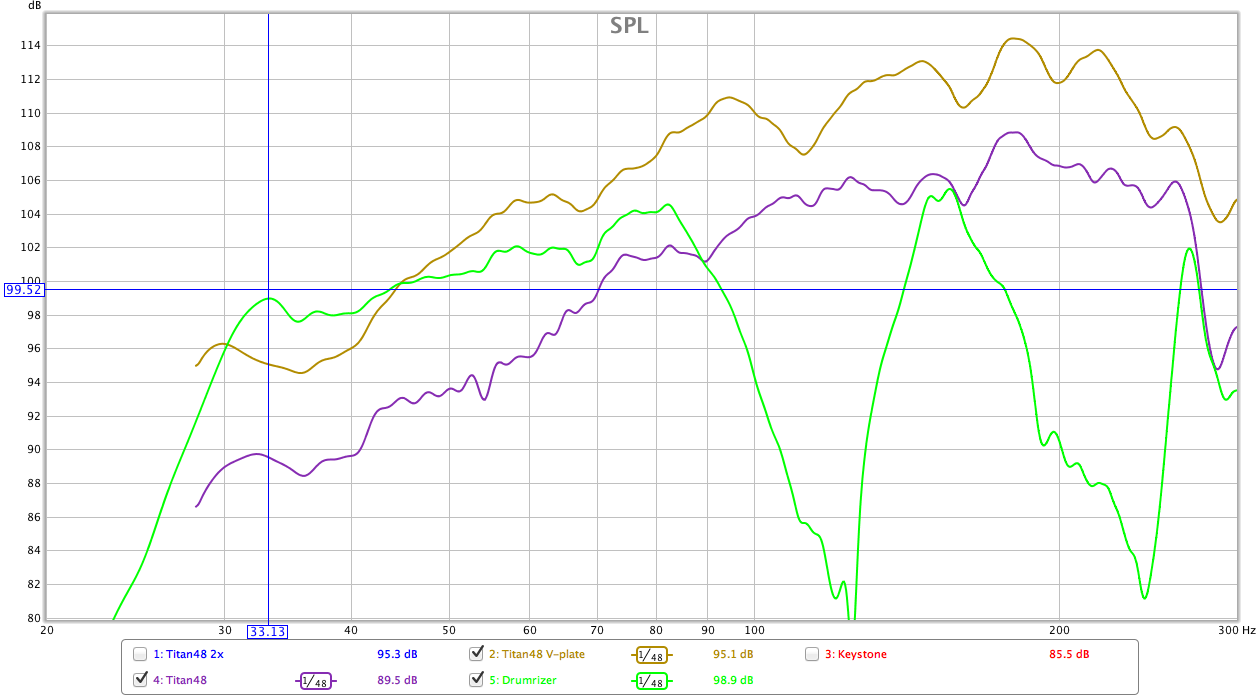
Single Titan 48 (+6 dB) vs dual Titan 48 vs dual V-plated Titan 48:
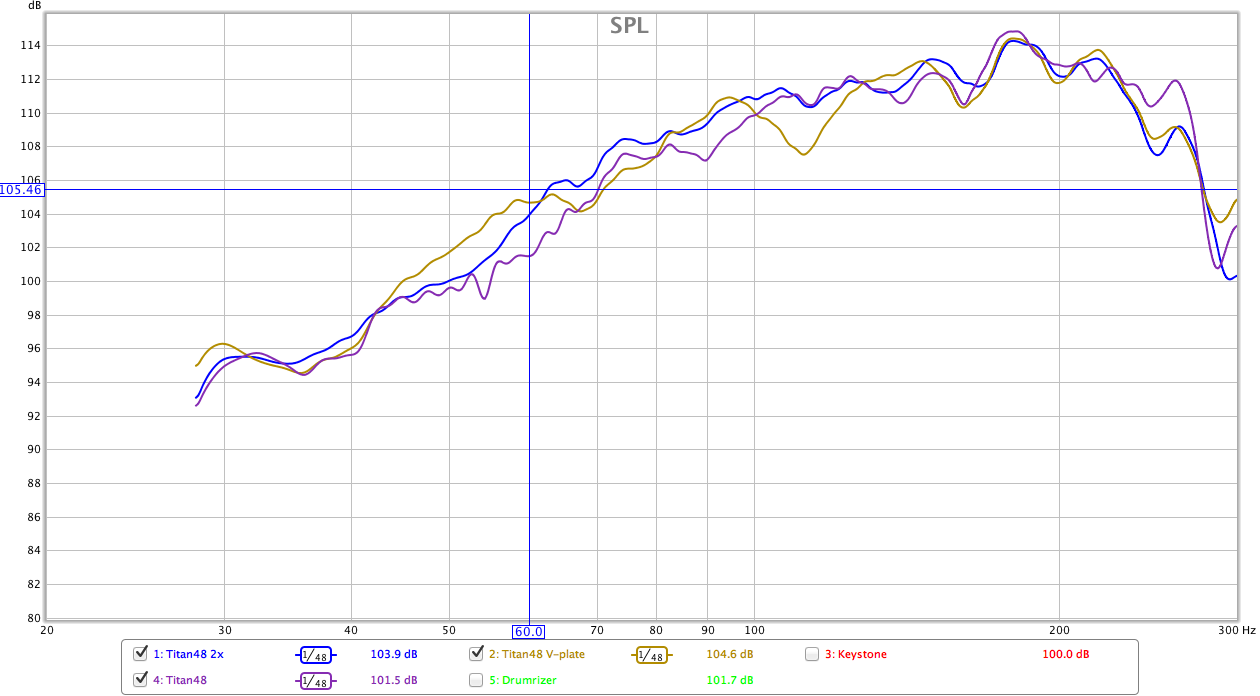
The discussion is now open... 😉
I have 3 different subs:
1. Art Welter's Keystone, loaded with B&C 18TBX46-4, the predecessor of the 18TBX100 with largely the same T/S-parameters. This woofer came out of a HK Lucas set. It is a 4 Ohms version and it is rated 1000 W RMS, 2000 W program.
2. Bill Fitzmaurice's Titan 48, loaded with Eminence Kappalite 3015LF (old version), 8 Ohms, and is rated 450 W RMS, 900 W program. Mine are built 21" wide instead of the recommended 24".
3. My own design doing double duty as a drumriser, loaded with 18Sound 18NLW9600, 4 Ohms, rated 1800 W RMS, 3600 W program. Details here (though Photobucket has f*cked up readability): http://www.diyaudio.com/forums/subwoofers/224823-beyma-18p80nd-sub-horn-am-missing.html
All measurements were taken at groundplane at 10 meter with 8.94 V (= 10 W into 8 Ohms) going into the sub(s). This was done to prevent clipping the measurement mic (I started at 28.3 V (= 100 W into 8 Ohms) but soon noticed the clipping 🙁. Dropping power by a factor of 10 lowers SPL by 10 dB, so I figured this would result in the best measurements I could do, still having enough margin over background noise (+/-65 dB). All graphs are offset +10 dB to correct for this and should provide the 'standard' 2.83V/1m curves.
1. Keystone:
2. Titan 48:
3. Drumriser:
Comparison charts
Keystone vs single and dual V-plated Titan 48:
Keystone vs drumriser:
Single and dual V-plated Titan 48 vs Drumriser:
Single Titan 48 (+6 dB) vs dual Titan 48 vs dual V-plated Titan 48:
The discussion is now open... 😉
Attachments
-
 Keystone.jpg664.9 KB · Views: 1,098
Keystone.jpg664.9 KB · Views: 1,098 -
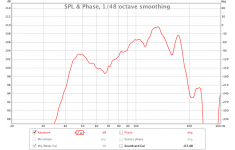 Keystone.png38.6 KB · Views: 1,148
Keystone.png38.6 KB · Views: 1,148 -
 Titan48.jpg797.6 KB · Views: 1,087
Titan48.jpg797.6 KB · Views: 1,087 -
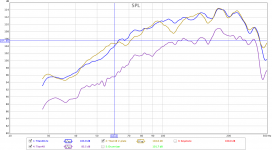 Titan48.png60.4 KB · Views: 1,100
Titan48.png60.4 KB · Views: 1,100 -
 Drumriser.jpg639.1 KB · Views: 1,071
Drumriser.jpg639.1 KB · Views: 1,071 -
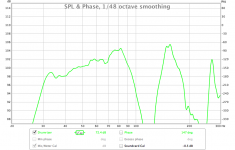 Drumriser.png41.3 KB · Views: 1,112
Drumriser.png41.3 KB · Views: 1,112 -
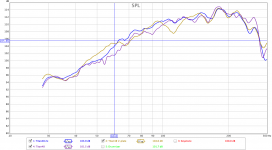 Titan48 +6dB offset.png59.4 KB · Views: 1,075
Titan48 +6dB offset.png59.4 KB · Views: 1,075 -
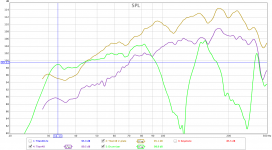 Drumriser vs Titan.png72.1 KB · Views: 1,078
Drumriser vs Titan.png72.1 KB · Views: 1,078 -
 Keystone vs drumriser.png63.9 KB · Views: 1,084
Keystone vs drumriser.png63.9 KB · Views: 1,084 -
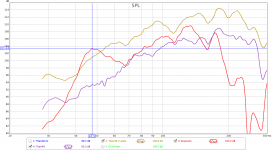 Keystone vs Titan48.png67.6 KB · Views: 1,178
Keystone vs Titan48.png67.6 KB · Views: 1,178
Looks like there's something wrong with the Keystone. Could be the driver, but IIRC it's tuned around 38Hz and should be flat to around there, not peaking at 48Hz and falling off a cliff.
Any chance you can do an impedance sweep to see what's going on?
Chris
Any chance you can do an impedance sweep to see what's going on?
Chris
Chris,Looks like there's something wrong with the Keystone. Could be the driver, but IIRC it's tuned around 38Hz and should be flat to around there, not peaking at 48Hz and falling off a cliff.
Something wrong for sure, odd that Thijs666 Keystone upper peaks look similar to the response with a BC 18SW115-4, but the low end is gone and there is a dip between 50 and 80 Hz. Sensitivity is also way higher than I would expect.
Art
Attachments
Djim,Hi all,
When a driver in a TH can't handle the compression you see similar behaviour.
Regards,
Djim
The 18TBX46 has only 201 grams MMS compared to 304.5 for the BC 18SW115.
That said, at only 8.94 volts/20 watts wouldn't think compression to be much of an issue.
Art
Hi Art,
Lower the compression ratio of a design and even a 200 gram 'lightweight' can handle it.
It 'only' needs to travel to 9mm and not 16 ;-)
Regards,
Djim
Lower the compression ratio of a design and even a 200 gram 'lightweight' can handle it.
It 'only' needs to travel to 9mm and not 16 ;-)
Regards,
Djim
There is a bit of a difference between the VAS and MMS of the 18SW115 and the 18TBX46. Maybe it's enough for the change of frequency response?
The sensitivity of the keystone is not abnormally high? For a 2,83V / 4ohm...
That drumriser sub is a beast. In both size and FR 😛
Interesting measurements. The Titan ones too, based on bill's website I expected that sensitivity to be a bit higher. 3" less shouldn't cost you 6dB @ 40Hz 😛
Could you upload the REW file? I would love to play around with those lines a bit.
We really should meet up some time and do some measurements 🙂 Maybe throw my 18SW115 in the keystone. My subs are almost ready 🙂
The sensitivity of the keystone is not abnormally high? For a 2,83V / 4ohm...
That drumriser sub is a beast. In both size and FR 😛
Interesting measurements. The Titan ones too, based on bill's website I expected that sensitivity to be a bit higher. 3" less shouldn't cost you 6dB @ 40Hz 😛
Could you upload the REW file? I would love to play around with those lines a bit.
We really should meet up some time and do some measurements 🙂 Maybe throw my 18SW115 in the keystone. My subs are almost ready 🙂
The Keystone was specifically designed to be used "standing up", the right hand measurement in post #4 is the response of the original Keystone "standing up", no dip, response to below 40 Hz before the roll off.Very interesting graphs. I think the dip is because the keystone is standing up.
Weltersys. I didn't know it was designed to get up 'stand up'. It just seems the most sense to me that some floor bounce was causing the dip. But since the mic is practically on the floor it did not made sense after I posted my comment. Then maybe the 'white wall' behind the KS could be a dip generator. All speculations of course! edit: but should also be visible on other subs. Well... it's back to the theoretically drawing board...
Last edited:
Hi all,
Does anyone have the T/S parameters of the B&C 18TBX46 (4Ohm) ???
I can only find the 8 ohm version on the web.
Regards,
Djim
Does anyone have the T/S parameters of the B&C 18TBX46 (4Ohm) ???
I can only find the 8 ohm version on the web.
Regards,
Djim
Weltersys. I didn't know it was designed to get up 'stand up'. It just seems the most sense to me that some floor bounce was causing the dip. But since the mic is practically on the floor it did not made sense after I posted my comment. Then maybe the 'white wall' behind the KS could be a dip generator. All speculations of course! edit: but should also be visible on other subs. Well... it's back to the theoretically drawing board...
To me, the measured response of the Keystone with that driver looks like a driver mismatch issue. A measurement of the driver's t/s parameters would provide enough data to confirm this. However not many times do you see a DIYer even measure the impedance response for their creations, much less the t/s parameters of the drivers they've used ... 🙁.
I hope to be able to do an impedance measurement tomorrow. If not, I'll have it by Friday for sure. Also, it would be possible for me to test the Keystone cabinet with an 18TBX100-8, but probably not on (really) short term.
Thank you guys for all the input! I was wondering about the Keystone response as well, but as I didn't change ANY settings, I can't see anything other than a big mismatch of the 18TBX46 for this cab. I don't have the T/S parameters but looking at all other subs B&C carries the parameters differ very little between their 4 and 8 Ohm versions... I figured the 4 Ohm 18TBX46 wouldn't differ too much from it's 8 Ohm brother. But that is starting to look like a misconception...
@Carneoleon:
Sure. Too bad I'm way down south :s...
Thank you guys for all the input! I was wondering about the Keystone response as well, but as I didn't change ANY settings, I can't see anything other than a big mismatch of the 18TBX46 for this cab. I don't have the T/S parameters but looking at all other subs B&C carries the parameters differ very little between their 4 and 8 Ohm versions... I figured the 4 Ohm 18TBX46 wouldn't differ too much from it's 8 Ohm brother. But that is starting to look like a misconception...
@Carneoleon:
Sure. Too bad I'm way down south :s...
I hope to be able to do an impedance measurement tomorrow. If not, I'll have it by Friday for sure. Also, it would be possible for me to test the Keystone cabinet with an 18TBX100-8, but probably not on (really) short term.
One other thing comes to mind - leakage around where the driver is screwed to the baffle. If the hole in the baffle was cut as if the driver was going to be mounted through the baffle instead of on top of it, this increases the risk of air-leaks being introduced. Cutting the hole a few mm smaller in diameter reduces this risk significantly and otherwise makes no difference in performance.
Considering the driver specs, this seems a likely cause, as the Keystone design was similar for a wide variety of drivers loaded in to it that varied more in their TS parameters than his driver.One other thing comes to mind - leakage around where the driver is screwed to the baffle.
Hi all,
Lower the compression ratio from the current 2.5 :1 into 1.8 :1 (S2 = >700cm^2) and the driver will be fine. It will make the Keystone somewhere around 63cm deep instead of the current 57.5cm .
Regards,
Djim
Lower the compression ratio from the current 2.5 :1 into 1.8 :1 (S2 = >700cm^2) and the driver will be fine. It will make the Keystone somewhere around 63cm deep instead of the current 57.5cm .
Regards,
Djim
Any chance you can do an impedance sweep to see what's going on?
Chris
Here it is:
The REW file with the measurements of all the subs can be downloaded from All subs outside.mdat - Google Drive (it's not edited in any way, so the curves are 10 dB too low, as explained in the OP).
Attachments
Here it is:
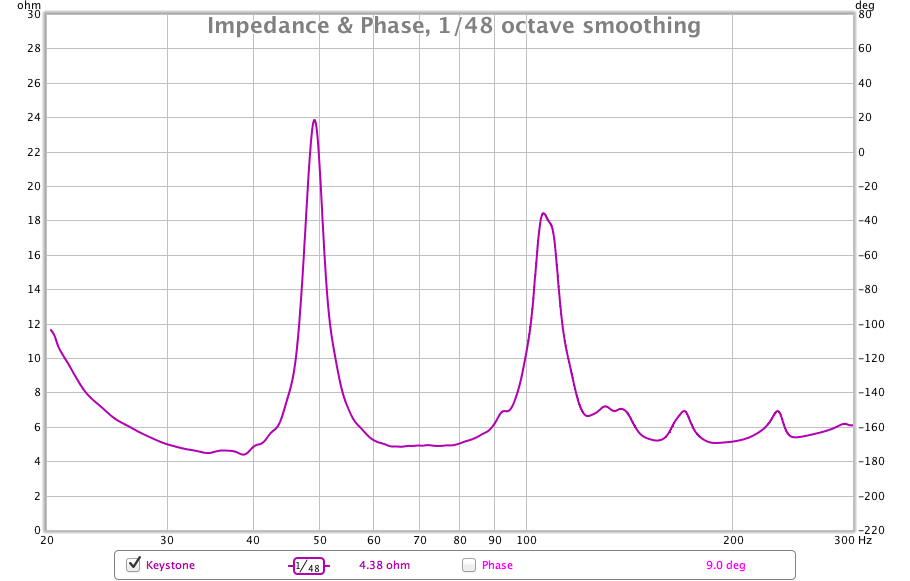
If you have a Hornresp simulation of the cab and driver used you can export the impedance as a text file and then import it into REW for a direct comparison. I use this all of the time to see how close my sims are to the real cab.
Mine measures similar to Arts and doesn't have the cut between 50 - 80 Hz. I can't lay my hands on my measurements but I'll post once it's finished.
Impedance plot of my build with B&C 18SW115 - 4. Only half of the box is glued and screwed and tempory screws are holding the side panel on.
Impedance plot of my build with B&C 18SW115 - 4. Only half of the box is glued and screwed and tempory screws are holding the side panel on.
Attachments
- Status
- Not open for further replies.
- Home
- Loudspeakers
- Subwoofers
- Measurements: Keystone vs Titan 48 vs Drumriser (homebrew)
